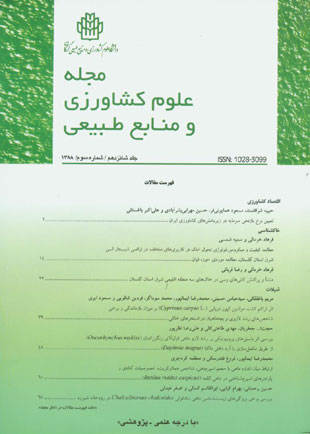Effects of Potassium Nutrition on Sesbania aculeate Plants Grown in Greenhouse under Salinity
Salinity is one of the most serious threats to yield reduction of crop and resulted to depletion of natural vegetation in many parts of world especially in Iran. Sesbania aculeata is moderately salt tolerant and may be utilized as forage crop for reclamation in semi-saline lands. The objective of the present study was evaluation of salt tolerance in Sesbania aculeata and investigation of the roles of potassium nutrition in salt effects alleviation. Plants were cultivated in greenhouse with Hoagland nutrient solution in sand culture. The experiment were conducted in completely randomized deign as a factorial. Factor one was salinity treatments including 0 and 100 mM NaCl and factor two was potassium treatments including 1, 2.5, 5, 10, 15, 20 and 40 mM K+. The plants harvested after 2 months treatments. The identified parameters were included fresh and dry mass, Na+ and K+, concentration and biochemical parameters including chlorophyll a and b, soluble sugar, amino acids content and peroxidase activity. The results indicated salinity reduced plants growth and decreased relative water content and imposed ions imbalance in plants tissues. Increase of salinity in root medium resulted to increment of Na+ and Cl- concentration and decrease of K+ and K+/Na+ ratio. Also, Salinity induced marked increase in peroxidase activity. Potassium treatments without salinity could be divided to 3 parts including critical, luxury and toxic nutrition. The optimum of plant growth was achieved in 1 mM potassium treatment without salinity and potassium toxicity in 40 mM K+ treatment caused increase in peroxidase activity and amino acids content and decrease of soluble sugar and consequently resulted to lower growth. In critical potassium nutrition (1 mM K+), Na+ and Cl- toxicity caused increase in peroxidase activity that resulted to relatively the lower growth under salinity. Salinity was intensified potassium toxicity (40 mM K+), decreased soluble sugar, increased peroxidase activity and consequently induced drastic growth reduction. The highest growth of plants under salinity was observed in 2.5 mM potassium nutrition. The results indicated that salinity enhanced potassium demand in Sesbania aculeate up to a threshold.
- حق عضویت دریافتی صرف حمایت از نشریات عضو و نگهداری، تکمیل و توسعه مگیران میشود.
- پرداخت حق اشتراک و دانلود مقالات اجازه بازنشر آن در سایر رسانههای چاپی و دیجیتال را به کاربر نمیدهد.




